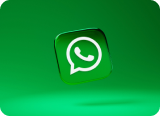WhatsApp Message Schedulers – How to Use Them to Enhance Brand Communication

With customers becoming accustomed to communicating with businesses digitally on apps like the WhatsApp Business API, the onus is on brands to have an efficiently functioning, automated communication system that helps them correspond with their many customers on a daily basis. Messages, whether they are related to promotions, orders, shipping, announcements, or even customer birthdays and anniversaries, need to be sent without fail in a timely manner. Brands simply cannot afford to miss out on the opportunity to connect with customers when it matters most.
However, corresponding with so many customers manually is an extremely time-and resource-consuming endeavour. Imagine an e-commerce company planning to send a special holiday season discount code to their loyal customer base via WhatsApp, hoping to capitalize on the festive shopping rush. The marketing teams try to dispatch the bulk messages manually. However, due to the huge volume of customers, a mix-up occurs with the discount codes, and several customers received incorrect codes. The error goes unnoticed for a while before customers started flooding customer service with complaints about non-functioning codes. The team scrambles to send out apologies with the corrected codes, but the damage is done. The delay and confusion causes frustration among customers, some of whom decide to shop elsewhere.
This incident could easily have been prevented if the team had access to a reliable automated scheduling tool that could have ensured that the right message went out to the right customer at the right time. This is why leading brands use WhatsApp Message Schedulers to manage their customer communications at scale, especially during critical sales periods. Having a reliable message scheduling system is critical to ensuring that promotions ran smoothly, enhancing customer satisfaction and trust in the brand.
Having a WhatsApp Message Scheduler enables businesses to plan and execute their messaging strategy with precision and efficiency. Let’s explore how WhatsApp message schedulers work, the benefits they offer, and some best practices for using these tools effectively.
How to Schedule Messages on WhatsApp?
Scheduling messages on WhatsApp can streamline communication for businesses, ensuring that messages are sent at the most opportune times without requiring manual intervention every time. Scheduling messages is easy for both Androids and iPhones. Here’s how it works.
For Android
You need to choose a third-party app like SKEDit as WhatsApp does not have a built-in feature for scheduling messages. You need to install the app and grant it the necessary permissions to access WhatsApp. Next, you need to open the app and select WhatsApp from the list of services. Enter the recipient’s details, type out your message, and set the date and time for when you want the message to be sent. You can decide if you want the app to send the message automatically or if you need to confirm before sending. Auto-send is great for hands-off operations, while confirmation is required to prevent accidental messages.
For iPhones
Scheduling WhatsApp messages on iPhone & iOS devices is more challenging compared to that for Android. For iPhones, you will need to download the Shortcuts app from the App Store. After opening the app, you need to press the “make personal automation” button and then set the time and date when you want the automation to run. Next you need to tap “add action”, and choose “text” from the search bar results. You need to type your desired message in the text section and select “Send message via WhatsApp” from the dropdown menu that appears. You will next need to select the recipient for whom the message is intended. With this done, you need to finalize the scheduling. The automation will notify you at the selected time. You must then manually complete the action by sending the message.
How Does Scheduling WhatsApp Messages Benefit Your Business?
Scheduling WhatsApp messages offers several benefits for businesses, enhancing communication efficiency and improving customer engagement. Here are key advantages:
Timely Communication
By scheduling messages, businesses can ensure that important information reaches customers exactly when it’s most relevant. This includes appointment reminders, payment confirmations, or special event notifications, which can help reduce no-shows and keep customers informed.
Global Reach at Appropriate Times
For businesses with an international customer base, scheduling messages allows for communication during the optimal times for different time zones. This ensures messages are received during reasonable hours, increasing the likelihood of prompt responses and engagement.
Consistency in Messaging
Scheduling helps maintain a consistent flow of communication. Regular updates, promotions, and news can be planned in advance, ensuring that customers receive steady, reliable information, which helps in building brand reliability and customer trust.
Efficiency and Productivity
Automating message delivery frees up staff time, reducing the need for manual messaging and allowing team members to focus on more complex tasks. This increases overall productivity and efficiency.
Improved Customer Service
Automated messages can provide instant responses to common queries or after-hours support, enhancing the customer service experience. Customers receive timely acknowledgments and basic support, improving their satisfaction and loyalty.
Enhanced Marketing
Scheduled messages can be strategically planned around marketing campaigns or special promotions. This allows businesses to maximize the impact of their marketing efforts by reaching customers at peak times of engagement.
Better Planning and Resource Allocation
With scheduled messaging, businesses can plan their communication strategy well in advance, allowing for better resource allocation and workflow planning.
Increased Sales Opportunities
By scheduling messages for specific times, such as during promotions or special sales, businesses can increase the chances of converting messages into sales, as customers receive timely reminders and calls to action.
What Are Some Best Practices for Scheduling WhatsApp Messages?
When scheduling automated messages on WhatsApp, it’s important to balance efficiency and personalization to maintain a positive relationship with your customers. Here are some best practices to consider:
Ensure Compliance with WhatsApp Policies
Ensure that your messages adhere to WhatsApp’s guidelines and terms of service. Automated messages should be used responsibly to avoid spamming users and risking suspension of your account.
Get Opt-In Consent
Always obtain explicit consent from users before sending them automated messages. This not only respects user privacy but also aligns with data protection regulations like the GDPR.
Customize Your Messages
Use customer data to personalize your automated messages. Addressing customers by name or referencing past interactions can make automated communications feel more personal and relevant rather than a generic one-size-fits-all message.
Send Them at the Right Time
Schedule messages based on the time zone and typical active hours of your audience to increase the likelihood of engagement. Avoid sending messages too early in the morning or too late at night.
Ensure Crispness and Clarity
Since WhatsApp is primarily used for quick and informal communication, keep your automated messages brief and to the point. Clear messaging helps prevent misunderstandings and improves user experience.
Make Them Meaningful for Customers
Every message should offer something valuable to the recipient, whether it’s important information, a helpful reminder, or an exclusive offer. Avoid sending messages that might be perceived as unnecessary or intrusive.
Include a Clear Call-to-Action (CTA)
If your message aims to encourage a specific action, include a straightforward CTA. This could be a request to visit a website, use a promo code, or reply to the message.
Monitor and Respond to Replies
Be prepared to handle responses to your automated messages. Even though the initial message is automated, you should provide a means for personalized follow-up based on the user’s response.
Test and Optimize
Continuously test different messages and scheduling times to see what works best. Use feedback and engagement metrics to refine your approach.
Respect User Preferences and Privacy
Allow users to easily opt-out of receiving automated messages and honor these preferences promptly. Always safeguard the privacy and security of user data.
Following these best practices can help you use WhatsApp automation effectively, enhancing customer satisfaction and engagement without compromising on personal interaction. WhatsApp message schedulers are a great way for brands to ensure their messages reach thousands of customers simultaneously and at the right time when users are most likely to engage with them. By automating the sending process, businesses can ensure that they are always reaching out to their customers at the right time and with the right message. With careful planning and adherence to best practices, the use of these schedulers can lead to improved engagement, greater efficiency, and ultimately, a higher level of customer satisfaction.




![[photo]](https://edna.io/wp-content/themes/edna/images/authors/paula-s.jpg)
![[icon]](https://edna.io/wp-content/themes/edna/images/authors/ico-linkedin.svg)